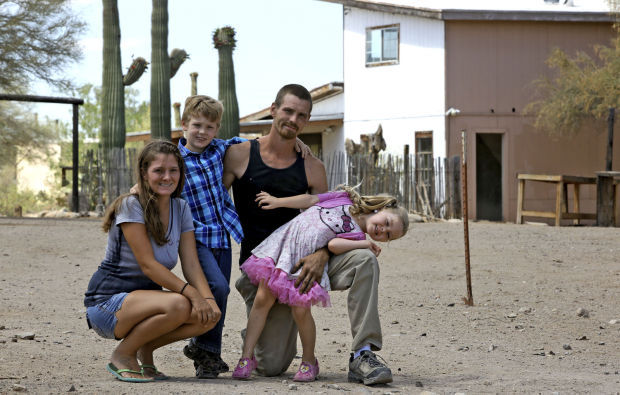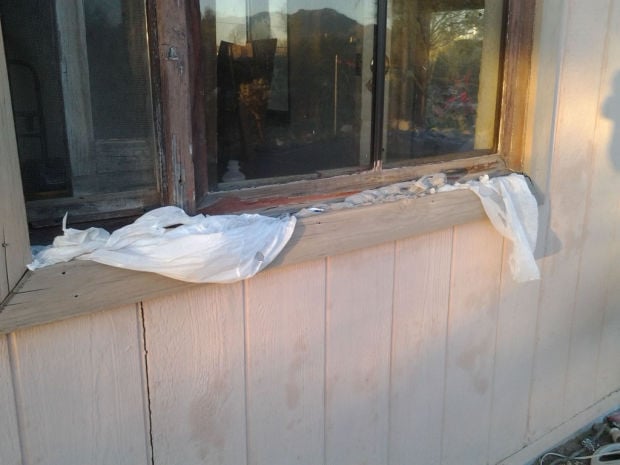Chrystle Porter and Bobby Tate tried repeatedly to get a county code inspector to document the leaks and mold they say made their rental home unlivable.
But Pima County code enforcers told Porter they donтt deal with conditions inside occupied residential properties. Thatтs because the county intentionally adopted a limited set of property maintenance codes to avoid the expense of addressing unsafe conditions inside run-down properties.
УлшжжБВЅ law gives counties the authority to adopt codes that apply to distressed, occupied homes. But if the county adopted such a code it would have to enforce it т and that would cost money the county doesnтt have, said Yves Khawam, chief building official in Pima County Development Services, which includes code enforcement.
The county adopted a limited version of the International Property Maintenance Code in 2003 that expanded enforcement to cover vacant structures but deleted sections related to occupied housing.
People are also reading…
To change that, the county Board of Supervisors would have to pay for expanding the code.
тThere is political will, but are there political resources?т Khawam said. тNo one wants to increase taxes.т
WHO HANDLES IT?
For a year and a half, Porter and Tate said, they talked to their landlord about leaks when it rained. After a heavy downpour in November, inches of water oozed across the floor. Finally, part of a wall collapsed, revealing mold behind it, they said.
тYou could instantly smell the mold,т Porter said. She took her children т Rihley, 4, and Tyler, 7 т to live across the street at their grandmotherтs house so they wouldnтt breathe in the air.
They said their landlord, Kevin Sack, refused to address the leaks and structural problems or the mold. After they demanded he make repairs, they said, he issued an eviction notice and would not accept their $600-a-month rent payments.
Sack disputed the coupleтs claims and said he evicted them only because they stopped paying rent after November. On the advice of Southern УлшжжБВЅ Legal Aid, Porter and Tate put their January and February rent in a security deposit box to show they were willing to pay.
тIтve been in the house. Thereтs no mold,т Sack said. He said Tate, without permission, removed a window to put in an AC unit and caused flooding. Porter and Tate said water came in through the roof and along the foundation of the home.
Without help from code enforcement, Porter said she was at a loss as to how to hold her landlord responsible under the landlord-tenant act, which required that a rental property be тfit and habitableт with facilities for electricity, plumbing, heating and cooling and ventilation.
тWe just want them to do their jobs,т she said of code enforcement. тIf they donтt do it, then who does handle this situation?т
DECENTRALIZED APPROACH
The Pima County Department of Environmental Quality can address potentially hazardous issues like raw sewage if itтs outside the home. But the department has no authority inside residential properties, said Beth Gorman, senior program manager.
Fire districts in unincorporated Pima County will disconnect utilities in response to immediate dangers like a gas leak or exposed wires. But they cannot compel landlords to fix the situation that caused the hazard, said Jim Pratt, a deputy fire marshal with Northwest Fire District.
Earlier this year, Kylie Collins, 33, kept smelling propane in her trailer at Eagleтs Nest mobile home park, where she lives with her husband and 9-month-old daughter. After calling General Electric with the year and model number of her water heater, she discovered that her unitтs natural gas water heater was not compatible with the trailerтs propane tank and could not be converted. Her landlord would not replace the water heater, insisting the two devices could be made compatible. Fearing for her safety, Collins said she repeatedly called Pima County code enforcement, to no avail.
тEverybody Iтve called at code enforcement has pointed the finger at someone else,т she said.
So she called the fire district, which disconnected the propane tank after a responding officer said the setup posed an immediate hazard. He told her not to reconnect it until a licensed professional installed a new water heater compatible with propane, Collins said. He also pointed out black soot on the bottom of the water heater, where he said it must have caught fire. But the fire district couldnтt force the landlord to make any repairs.
Collins and her family still live in the trailer, without hot water or a stove, because they canтt afford to move and lose their security deposit. She has filed a civil case against her landlord, Sergio Leyva, in Superior Court and hopes to get a waiver, based on her low income, for the hundreds of dollars in court fees sheтs paid.
Leyva says he doesnтt know why the fire department disconnected the propane tank, but he denies there was a safety issue. He and his attorney would not comment further.
BIGGER PICTURE
County officials say Collinsт case is an example of the system working: She got the fire department involved and is using the rights under the УлшжжБВЅ Residential Landlord and Tenant Act to pressure her landlord to make repairs.
But housing attorneys at Southern УлшжжБВЅ Legal Aid say the responsibility for enforcing minimum housing standards should fall to the government, not low-income renters. They say leaving it up to tenants rarely results in distressed homes actually getting fixed, as most tenants sue for money to relocate т if they can afford the expense of going to court in the first place.
Tenants in unsafe housing can pursue legal action against their landlords using the Landlord-Tenant Act. The county gives Southern УлшжжБВЅ Legal Aid $100,000 a year to help address this and other legal issues for low-income clients, said Margaret Kish, director of the countyтs Department of Community Development and Neighborhood Conservation.
Eviction proceedings are handled in Pima County Consolidated Justice Court, which is where tenants fighting for repairs can end up. Judges canтt force landlords to make repairs during eviction proceedings, even if they find in the tenantтs favor. They can only order landlords to give tenants money to move somewhere else, said Maria Felix, chief administrative judge.
Struggling tenants often withhold rent to pressure their landlords to make repairs. But attorneys say thatтs a bad idea т failure to pay rent can be a valid basis for eviction, whatever the reason. Justice Court judges sometimes are unwilling to hear tenantsт rationale for not paying, as lack of payment cases appear open and shut.
If tenants file a civil complaint against their landlord in Justice Court т which starting next month will cost $98 т they must remain living in the distressed property in order for the judge to force the landlord to make repairs, Felix says. Few are willing to do that.
тWhy would anyone wait a year in impossible conditions for a remedy which may never be granted?т said Beverly Parker, attorney with Southern УлшжжБВЅ Legal Aid.
Slumlords know code enforcement will not intervene and that poor tenants are unlikely to sue, Parker said.
тPublic safety is a basic government function,т she said. тWhy is this not part of that?т
But judges donтt necessarily know that. Doug Kooi, administrator of the Pima County Consolidated Justice Courts, said most Justice Court judges are unaware that the county doesnтt do enforcement inside residential properties.
тActually, the first response Iтve been getting is that they should call county code enforcement or the building department to seek assistance in what would be code violations,т he said.
Fines as a deterrent
Addressing all residential housing violations in the county would likely cost millions, county officials said. Once inspectors start looking for violations or responding to complaints, theyтd certainly find problems and would have to condemn properties and possibly pay to relocate residents.
тRelocation is extremely expensive,т Kish said.
Projections done in 2007 suggested a cost of $16 million т including inspections, repairs and relocation services for families т if 2,500 distressed homes were inspected and half were found to need assistance. On the lower end, if only 500 distressed homes were inspected, the cost would be about $3 million, the estimates said.
But if enforcement were expanded to cover rental properties, the countyтs expense could be offset by fines against negligent property owners, Parker said.
тIt would certainly have a deterring effect on those that are ignoring the laws,т she said. тI know this is the Wild West and things in the county are different, but that makes people that live out there even more vulnerable to bad practices.т
The city of УлшжжБВЅ, which does enforce code inside occupied properties, relocates families by partnering with social-service agencies. The cityтs code enforcement budget is $2.5 million for the upcoming fiscal year, said Ernie Duarte, director of Planning and Development Services.
Adapting to misery
Many low-income renters find ways to adapt to living without power or water because they have nowhere else to go, said Betty Villegas, program manager with the Pima County Housing Center.
тItтs not right. But itтs survival,т she said.
Affordable-housing advocates hope to get $30 million to boost local options through next yearтs bond election. But in previous elections, in 1997 and 2004, only $5 million and $10 million respectively went to address the need, Villegas said.
County Supervisor Richard Elias said heтd consider expanding the Pima County code to cover propertiesт interiors, but first the Board of Supervisors would need detail on projected costs.
тIs money tight? Yes. But how do you quantify the value of where a child lives?т he said.
County Supervisor Sharon Bronson agreed but said the government shouldnтt be paying for what is a landlordтs responsibility.
тFor people to live in unsuitable conditions as a result of landlordsт failure to respond is unacceptable,т she said. тIf weтve got some issues and thereтs a health concern, I certainly am supportive of looking at a change in policy.т
Supervisor Ray Carroll said distressed housing hasnтt been a systemic problem in his district and he would not support expanding government bureaucracy. He recommends tenants contact their supervisor to have him or her deal with it personally, as he said heтs done in the past.
Pima County Development Services director Carmine DeBonis said that since the Star raised the issue, code officials have discussed extending enforcement to rental units.
тItтs not that this is something the county is unwilling to address,т he said. тUp to this point, weтve not had a demonstrated pattern of difficulties. ... Weтre learning that there may be some difficulties associated with our approach.т
Settlement desired
Porter and Tate, who moved out in February, decided to sue their landlord in Superior Court because their claims exceed Justice Courtтs $10,000 limit.
Like in Justice Court, Superior Court judges canтt force landlords to improve a property if the tenant has moved out. But the couple hopes to reach a settlement before trial that would include repairs to the home, even though they no longer want to live there.
Tate recalls how county zoning inspectors questioned him about the cars he was repairing in his yard last year. Yet he couldnтt get anyone to care about the conditions his kids were living in, he said.
тThey care about what your yard looks like,т he said. тThey donтt care about what your house is like.т














